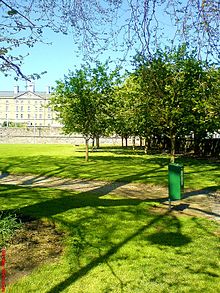- Croppy
-
Croppy (sometimes spelt croppie) was a nickname given to Irish rebels during the period of the 1798 rebellion.
Contents
Origin
The name "croppy" derives from Ireland in the 1790s as a reference to people with closely cropped hair, a fashion which was associated with the anti-wig (and therefore, anti-aristocrat) French revolutionaries of the period. Those with their hair cropped were automatically suspected of sympathies with the pro-French underground organisation, the Society of United Irishmen, and were consequently liable to seizure for interrogation by pro-British forces. Suspected United Irish sympathisers were often subjected to torture by flogging, picketing and half-hanging but the reactive contemporary torture, pitchcapping, was specifically invented to intimidate "croppys". There is evidence of United Irish activists retaliating by cropping the hair of loyalists to reduce the reliability of this method of identifying rebel sympathisers.
References
- The name is referenced in the title of two famous folk-songs of the period: the antagonistic loyalist song, "Croppies Lie Down", and the sympathetic rebel song, "The Croppy Boy".
- The memorial park in front of Collins Barracks, Dublin (now a part of the National Museum of Ireland) is known as the "Croppy Acre", as the remains of rebels executed during the 1798 rebellion are said to lie there.
- In the church at Crooke, County Waterford, there is a marker to indicate the grave of the "Unknown Croppy", (the "Unknown Soldier" of the rebellion) as the nearby Passage East and Geneva Barracks were sites of execution and transportation of many rebels. The GPS coordinates for the grave of the Croppy Boy are N 52° 13.642' W006° 58.756' and the GPS coordinates for Geneva Barracks are N 52° 13.042' W006° 58.737'.
- The Pikeman Memorial, commemorating the 1798 Risings, in Tralee, is known locally as "The Croppy Boy".
- Seamus Heaney commemorated the fate of thousands of fallen United Irish rebels in his 1966 poem Requiem for the Croppies .
- The term is used throughout Leon Uris' historical novel on Ireland, "Trinity".
See also
External links
Categories:- Irish Rebellion of 1798
- Pejorative terms for people
Wikimedia Foundation. 2010.


